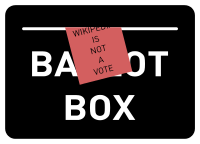This is an explanatory essay about the Wikipedia:Consensus and Wikipedia:What Wikipedia is not policies. This page provides additional information about concepts in the page(s) it supplements. This page is not one of Wikipedia's policies or guidelines as it has not been thoroughly vetted by the community. |
| This page in a nutshell: Most decisions on Wikipedia are not made by popular vote, but rather through discussions to achieve consensus. Polling is only meant to facilitate discussion, and should be used with care. |
Wikipedia works by building consensus. When conflicts arise, they are resolved through discussion, debate and collaboration. While not forbidden, polls should be used with care. When polls are used, they should ordinarily be considered a means to help in determining consensus, but do not let them become your only determining factor. While polling forms an integral part of several processes (such as Wikipedia:Articles for deletion), polls are generally not used for article development. Remember that Wikipedia is not a democracy; even when polls appear to be "votes", most decisions on Wikipedia are made on the basis of consensus, not on vote-counting or majority rule. In summary, polling is not a substitute for discussion.
There are exceptions to this custom such as the election of Wikipedia's Arbitration Committee members (which has been determined by a secret ballot voting system since 2009) or for wider cross-project activities such as electing stewards. Such processes can be completed without detailed rationales from their participants. In addition, certain bodies (such as the Arbitration Committee, Wikimedia Foundation Board of Trustees, or Jimmy Wales) can on occasion impose decisions regardless of consensus.
